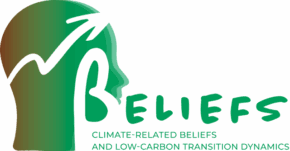The transitioning to a low-carbon society, as mandated by the Paris Agreement and net-zero targets, requires substantial investments. These decisions rely heavily on firms’ expectations, yet significant knowledge gaps exist: current models can’t fully assess their impact, empirical data is limited, and there’s little understanding of what drives their evolution and how to align them with climate goals. Misaligned expectations risk failure or disorderly decarbonisation. The BELIEFS project will lay the foundations of a novel analytical framework capable of shedding light on the complex interaction between firms’ beliefs, investment decision-making and climate policy strategies, so as to identify credible paths to a netzero society. The project will deliver a methodological breakthrough by developing a dynamic transition model with a realistic representation of expectations as heterogeneous, evolving and interdependent. A large survey will provide the first comprehensive empirical assessment of transition expectations and their influence on decisions. The results of the project will be pivotal in identifying effective policy and institutional strategies to ensure alignment of beliefs, thereby enabling a swift and orderly decarbonisation process. Over the course of five years, BELIEFS aims to offer pioneering interdisciplinary contributions to advance our understanding of the macro-behavioural dimensions of low-carbon transitions, integrating elements from climate economics, transition theory, behavioural sciences and political economy.
General aims
The project aims to find reliable ways to develop a zero-emission society:
- providing novel insights into the nature and defining characteristics of firms’ transition-related expectations;
- exploring the key mechanisms through which heterogeneous expectations affect investment decision-making, policy-making and the broader dynamics of the low-carbon transition.
- outlining effective policy and institutional strategies to align firms’ expectations so as to ensure a rapid and orderly low-carbon transition.
CMCC role
CMCC is the additional beneficiary and will contribute to the activities planned in WP3, being responsible for the credibility assessment in Activity 3.1. It will also mainly handle the development of the analytical framework (Activity 4.1) and its calibration (Activity 4.2), both related to WP4. Furthermore, CMCC will contribute to all dissemination and outreach activities.
Activities
The project revolves around a coherent research structure divided into four interconnected work packages (WP). BELIEFS’s main focus will be analyzing dynamic decarbonization pathways outlined in WP4, with all work packages aligning toward this goal. WP1 will explore several key aspects of climate-related beliefs, especially expectations, by surveying both private firms and policymakers. The insights from WP1 will guide the design and calibration of models in WP4 and will be compared with the empirical analysis carried out in WP3. WP2 will involve conducting laboratory experiments to better understand the dynamic characteristics of expectations, their impact on investment decisions, and how policies can align these expectations with climate goals. The experimental design in WP2 will complement the WP1 surveys and provide essential data for modeling in WP4 and policy analysis in WP3. WP3 will analyze policy credibility and institutional commitment through empirical and political economic methods, primarily focusing on these aspects. Its findings will also help shape the laboratory experiments and model simulations. WP4 aims to develop an innovative modeling framework that captures the complex effects of diverse expectations on transition dynamics. Numerical simulations of transition pathways, designed and calibrated based on all other WPs, will produce key results to address how expectations influence low-carbon transition dynamics and how to align expectations with policy targets. Finally, outreach activities will share the results of BELIEFS with a wide range of relevant stakeholders.
Expected results
BELIEFS will lay the foundations of a novel analytical framework capable of shedding light on the complex interplay between firms’ beliefs, investment decision-making and climate policy strategies, so as to identify credible paths to a net-zero society.
The project will generate ground-breaking and timely insights into:
(i) the distribution of transition-related expectations;
(ii) factors influencing their evolution;
(iii) the mechanisms through which they affect investment decision-making; and
(iv) their dynamic interactions with policy and institutional factors.
Partners
CMCC additional beneficiary


